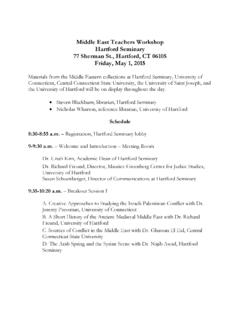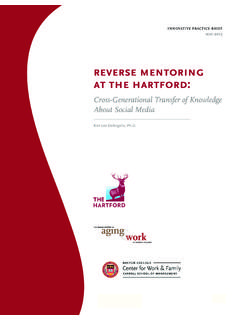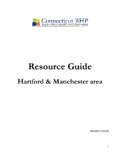Transcription of AT THE CROSSROADS - The Hartford
1 Safe Driving for a Lifetime AT THE. CROSSROADS . Family Conversations about Alzheimer's Disease, Dementia & Driving The Hartford Financial Services Group, Inc., and the MIT AgeLab have developed this guide to help people with dementia and their families prolong independence while encouraging safe driving. The guide provides suggestions for monitoring, limiting and stopping driving. The information incorporates the experiences of family caregivers and people with dementia, as well as suggestions from experts in medicine, gerontology and transportation. Our children talked to him about possibly not driving. They don't know it, but he cried that night.
2 Driving is extremely important to him. I don't want to strip him of his dignity.. - Wife whose husband has mild dementia Balancing Independence and Safety Today, more than 5 million people in the suffer My sons and daughters from dementia, with Alzheimer's disease being the most common form. And this number is expected to grow as had a meeting without the population ages. me and decided that Do you have a relative with dementia who's still driving? they want me to stop Do you worry about him or her driving? driving, but they're Or are you just hoping his or her driving is good making a big deal out enough? . If you have a loved one of nothing.
3 I'm very diagnosed with dementia, you'll struggle with a comfortable on the road. number of caregiving challenges from medical I've driven longer than and daily care to financial and legal matters. Driving, of course, can be an immediate and life-threatening issue making it a family priority. they've been alive.. It's difficult to decide when someone with dementia should Person recently diagnosed stop driving, since you need to balance safety considerations with dementia with the person's sense of independence, pride and control. Most information about dementia warns against driving, but doesn't help you determine when it should stop.
4 1. The Difficulties of Dementia and Driving When you drive, different regions of your brain cooperate to receive sensory data (through sight and hearing), prioritize information, recall related past experiences, anticipate likely scenarios, analyze options, plan ahead, use proper judgment, synchronize movement responses, and juggle more than one task at a time. And, because of the nature of driving, each of these required tasks needs to be accomplished with adequate speed. Depending on the specific difficulties of the individual - and every individual with dementia may initially present with a We know different pattern of difficulties based on the specific areas of brain damage one or more of these functions may be impaired.
5 It's the specific profile of these difficulties that can pose a risk for some that stopping individuals in the early stages of dementia. him from driving In the early stages of dementia, many people usually are still socially engaged and able to manage daily activities including safe driving. is the first of However, all people with irreversible dementia will eventually become unsafe to drive because of the degenerative, progressive nature of the many indignities brain disease. The question is: at what point is someone unable to continue to drive safely? That nagging question surfaces early. to come. For most people, driving represents freedom and control.
6 It's a way to access healthcare, to buy necessities, to be productive and to stay He thinks he's connected to family, friends and the community. Giving up driving can be a deeply personal and emotional issue. not much of If someone in your family is diagnosed with dementia, you can encour- a man without age that person to express what the loss of driving means on a personal level. Talking openly at this early stage can help smooth the transition to eventually not driving. Try to imagine what your life would be like a car. It's so if you couldn't drive, and encourage the person with dementia to share his or her feelings. You also might encourage that person to confide difficult to in a friend about what it means to give up driving.
7 Know where to Not Like Changes Common in Later Life As we age, even those of us without dementia may experience physical draw the line. changes that affect driving including eyesight problems and slower reaction times. In response, most people will modify the way they drive by avoiding driving on certain roads or at night. They usually can assess Daughter of a person and regulate their driving without family intervention and can continue with dementia to drive safely throughout their lives. 2. But it's different for those with Alzheimer's disease driving. But it does signal the need for increased or other dementias particularly because the condi- monitoring and assessment.
8 Tion can be gradual and unpredictable. Drivers with dementia often modify their driving by driving less Assessing Driving Abilities at night or in unfamiliar areas, but as their abilities Once someone has been diagnosed with dementia, diminish, they lose the capacity to determine when it is critically important to be on the lookout for they should stop driving. They're likely to minimize changes in their driving skills. Family members are the complexity of driving and overestimate their often in the best position to monitor changes in abilities. They may lose the ability to be aware of driving skills such as attention span, distance per- their own neurological and thinking problems.
9 Ception or ability to quickly process information. They may make excuses or blame others for their high-risk driving behaviors, and may say things like: You can refer to the Warning Signs for Drivers with Dementia on page 11 for a systematic, objective way Just because I got lost doesn't mean I can't drive. to assess driving over time. You can refer to your notes I make sure I look where I'm going. on this worksheet when making driving-related deci- I've driven many, many years and haven't had sions and can use them in your conversations with an accident yet. healthcare providers. You may also want to consider getting an independent opinion by arranging for a As the person begins to lose driving and self-assess- Comprehensive Driving Evaluation.
10 Ment skills, serious risks increase and caregivers must step in. If you don't know what to look for, you might miss opportunities to notice driving behaviors when you Finding a Balance ride with your relative. As a result, you might over- The challenge with driving and dementia is to pre- look subtle changes or dismiss incidents as not being serve a person's sense of independence for as long as cause for serious concern. The Warning Signs list can possible, while simultaneously protecting the safety help you be more attentive to any decline in abilities. of that person and others. Consider the frequency and severity of incidents.







